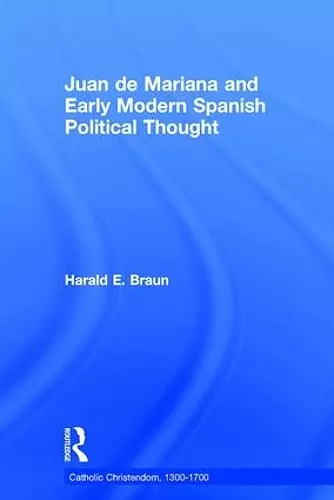Juan de Mariana and Early Modern Spanish Political Thought
Format:Hardback
Publisher:Taylor & Francis Ltd
Published:6th Jun '07
Currently unavailable, and unfortunately no date known when it will be back

The Jesuit Juan de Mariana (1535-1624) is one of the most misunderstood authors in the history of political thought. His treatise De rege et regis institutione libri tres (1599) is dedicated to Philip III of Spain. It was to present the principles of statecraft by which the young king was to abide. Yet soon after its publication, Catholic and Calvinist politiques in France started branding Mariana a regicide. De rege was said to empower the private individual to kill a legitimate king. Its 'pernicious doctrines' were blamed for the murder of Henry IV in 1610, and it was burned at the order of the parlement of Paris. Modern historians have tended to build on this interpretation and consider De rege a stepping stone towards modern pluralist and democratic thought. Nothing could be further from the truth. The notion of Mariana as an uncompromising theorist of resistance is in fact based on the distorted reading of a few select sentences from the first book of the treatise. This study offers a radical departure from the old view of Mariana as an early modern constitutionalist thinker and advocate of regicide. Thorough analysis of the text as a whole reveals him to be a shrewd and creative operator of political language as well as a champion of the church and bishops of Castile. The argument as a whole is informed by a Catholic-Augustinian view of human nature. Mariana's bleak, at times downright cynical view of man imparts focus and coherence to a text that challenges well established terminological boundaries and political discourses. In the first instance, his deeply pessimistic appraisal of human virtue justifies his disregard of positive law. He is thus able to mould diverse elements extracted from Roman and canon law, scholastic theology and humanist literature into a deliberately equivocal discourse of reason of state. Finally, this secular interpretation of the world of politics is cleverly yoked to a thoroughly clerical agenda of reform. In fact, reason of state is made to propagate an episcopal monarchy. De rege is exceptional in that it strings together a curious scholastic theory of the origins of society, a conservative ideology of absolute monarchy and a breathtakingly radical vision of theocratic renewal of Spanish government and society. Juan de Mariana...
’... a book of prime importance: a brilliant and incisive study of one of the most celebrated, indeed infamous, political philosophers of the Spanish Golden Age. ...Dr Braun's study of Mariana and of De rege is highly compressed in its analysis and uncompromising in its scholastic rigour. ...his book will be required reading for everyone interested in political theory and courtly politics in Spain, for it adds substantially to our understanding of the intellectual background, to the ebb and flow of courtly politics. ... Dr Braun is to be congratulated on placing this most difficult of writers into his proper context and in introducing him to a wider audience.’ Reviews in History ’... this is an important book on a major political writer of early modern Spain.’ Journal of Ecclesiastical History ’... it is the benchmark against which future accounts of Mariana, and for that matter of the second scholastic and reason of state, must be judged.’ History of Political Thought ’Braun places Mariana’s thoughts squarely in the Europe of his day (1599) and provides a wonderful treatment of an important writer...’ Sixteenth Century Journal ’This learned study of Juan de Mariana’s 1599 treatise De rege et regis intitutione (On Kingship) is a welcome contribution to the history of early modern political thought.’ Bulletin of Spanish Studies ’The re-examination of Mariana in light of recent historiographical developments is a valued addition to the prestigious series ’Catholic Christendom, 1300-1700’.’ Heythrop Journal
ISBN: 9780754639626
Dimensions: unknown
Weight: 453g
214 pages